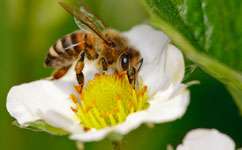Honey bee.
Bumblebees, solitary bees and other wild pollinating insects are much more important for pollinating UK crops than previously thought, say researchers.
They found that honeybee populations have nose-dived so dramatically in recent years that they can only do half as much pollination as they did in the early 1980s.
Where honeybees used to provide around 70 per cent of the UK's pollination needs they now only pollinate a third. At worst, that figure could well be more like 10 to 15 per cent.
Paradoxically over the last 20 years, the proportion of UK crops that rely on insects for pollination has risen from just under 8 per cent in the early 1980s to 20 per cent in 2007. And over the same period, yields of insect-pollinated crops, which include oil seed rape and field bean, have gone up by 54 per cent.
This means that honeybees can't be solely responsible, or aren't the only important pollinator.
So if honeybees aren't pollinating the crops, what is? The researchers think that other important pollinating insects, such as bumblebees, hoverflies and solitary bees must be making up the shortfall.
"Our finding suggests that wild insect pollinators make a much bigger contribution to UK crop pollination than previously thought," says Tom Breeze from the University of Reading, lead author of the study.
£400 million per year
Insect pollination is estimated to be worth around £400 million per year to UK crop agriculture. And until now, people have widely assumed that honeybees are the most important pollinators, with a figure of around 90 per cent of pollination services coming from honeybees bandied around.
"We had an inclination that this wasn't an accurate figure at all," says Breeze. "Honeybees have been in decline for years, so it didn't make sense."
Indeed, there's zero large scale research that backs up the assumption that honeybees are the biggest pollinators.
So Breeze and colleagues from the University of Reading set out to learn how important insect-pollinated crops are to UK agriculture and – using data from an earlier study – to figure out the real contribution from honeybees.
This is the first time anyone has looked at the contribution from both honeybees and other pollinators on such a grand scale.
"Bumblebees, hoverflies and red mason bees are key wild pollinators, but there are at least 250 bee species alone in the UK, which we thought almost certainly contribute more than honeybees do," Breeze says.
Although Breeze and his colleagues found that honeybees don't provide the same level of service that other species do, they point out that it's not one pollinator or the other that's important; both types are crucial.
"There was a seminal study in 2006 which found that you get the best pollination, best yields and best fruit when you have both wild pollinators and honeybees," says Breeze.
He says the next step for this research is to do the same thing on a Europe-wide scale to compare different countries with the situation in the UK and to go into fields to see which pollinators are pollinating.
"This study challenges the long held beliefs surrounding the importance of honeybees as the major pollinators and could potentially result in a paradigm shift in people's thinking," says Science and Innovation Manager Dr. Andrew Impey from the Natural Environment Research Council.
The research is published in Agriculture, Ecosystems and Environment.
This story is republished courtesy of Planet Earth online, a free, companion website to the award-winning magazine Planet Earth published and funded by the Natural Environment Research Council (NERC).
More information: T.D. Breeze, et al., Pollination services in the UK: How important are honeybees?, Agriculture, Ecosystems & Environment, published online 20 May 2011, doi:10.1016/j.agee.2011.03.020
Provided by PlanetEarth Online






















